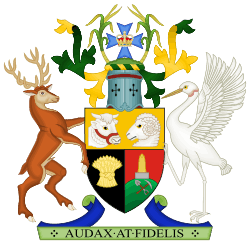Cabinet of Queensland
The Cabinet of Queensland is the chief policy-making organ of the Government of Queensland.
Composition
The Cabinet has the same membership as the Executive Council: the Premier and ministers (including the Deputy Premier and Attorney-General). Assistant ministers, formerly called parliamentary secretaries,[n 1] are not members.
Current members
| Portfolio | Minister |
|---|---|
|
Annastacia Palaszczuk |
|
Jackie Trad |
|
Curtis Pitt |
|
Stirling Hinchliffe |
|
Cameron Dick |
|
Kate Jones |
|
Anthony Lynham |
|
Yvette D'Ath |
|
Bill Byrne |
|
Mark Bailey |
|
Leeanne Enoch |
|
Steven Miles |
|
Coralee O'Rourke |
|
Shannon Fentiman |
|
Mick De Brenni |
|
Leanne Donaldson |
|
Grace Grace |
Role
Unlike the Executive Council, which is a mechanism for advising the Governor, the Cabinet meets without the Governor and is responsible for formulating and coordinating policy. In effect, the Executive Council is a vehicle for implementing decisions made in Cabinet.[3] Individual ministers are collectively responsible for the decisions made by Cabinet, so if a minister is unwilling to publicly support a collective decision of Cabinet, he or she is expected to resign.[4]
Meetings
Meetings of the Cabinet are usually held on 10:00 a.m. on Mondays in the Executive Building's Cabinet Room. The Premier (or Deputy Premier in her or his absence)[4] chairs its meetings[5] and establishes its agenda.[6] All members are expected to be present at all meetings unless excused by the Premier.[5]
See also
Notes
- ↑ In establishing his ministry, Campbell Newman renamed them assistant ministers as he believed the term more easily understood.[1] The Constitution of Queensland Act 2001 and other statutes still use the name parliamentary secretaries.[2]
References
- ↑ "Newman appoints familiar faces". Brisbane Times. 27 March 2012.
- ↑ Constitution of Queensland Act 2001, section 24.
- ↑ "6.3 Approval Process". Executive Council Handbook. Department of Premier and Cabinet. Retrieved 3 April 2012.
- 1 2 "1.2 The Cabinet and collective responsibility". Cabinet Handbook. Department of Premier and Cabinet. 3 April 2012.
- 1 2 "1.3 Ministers". Cabinet Handbook. Department of Premier and Cabinet. 3 April 2012.
- ↑ "4.3 Determination of the business list for Cabinet meetings". Cabinet Handbook. Department of Premier and Cabinet. 3 April 2012.
